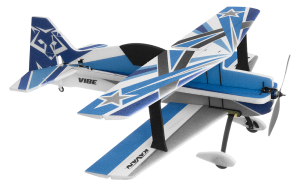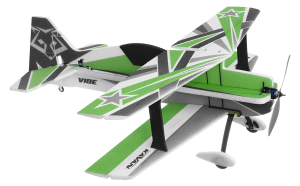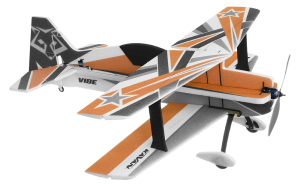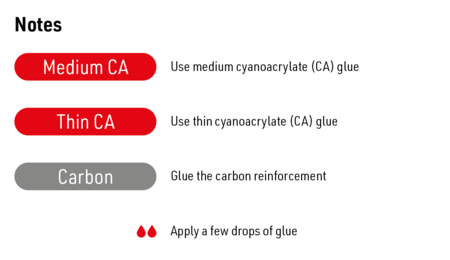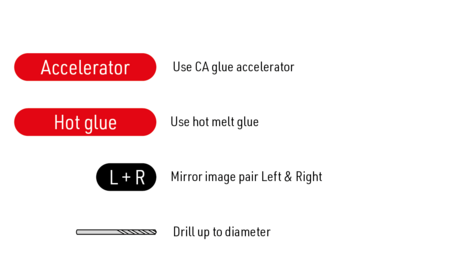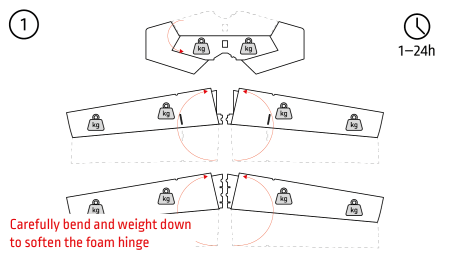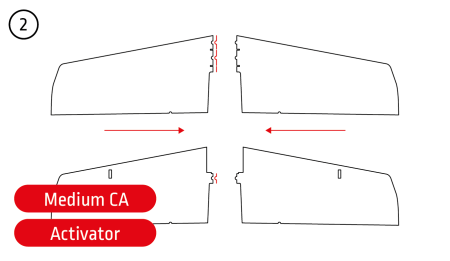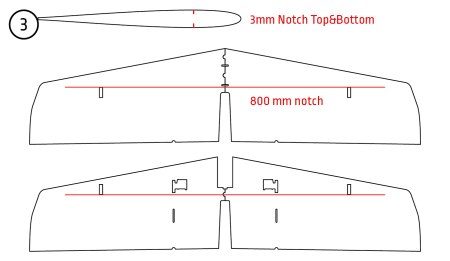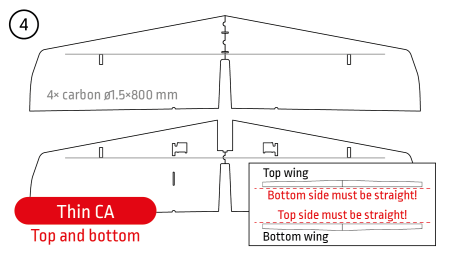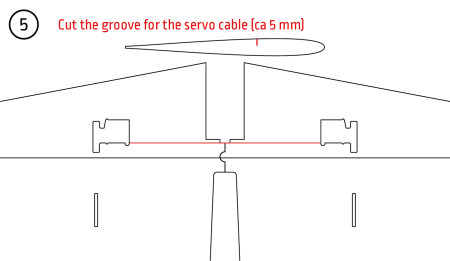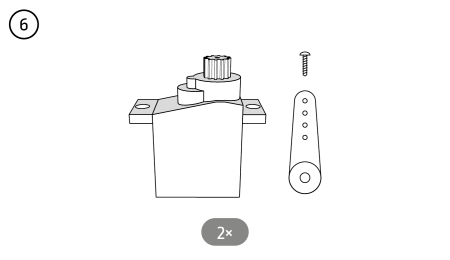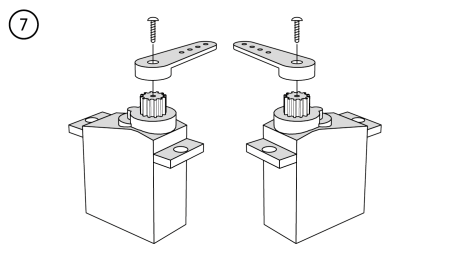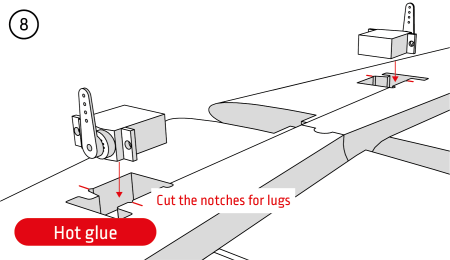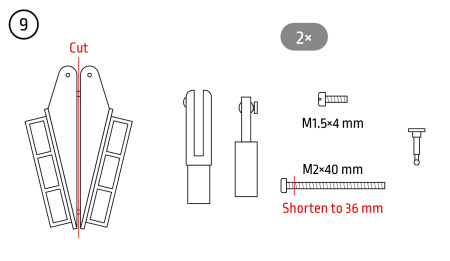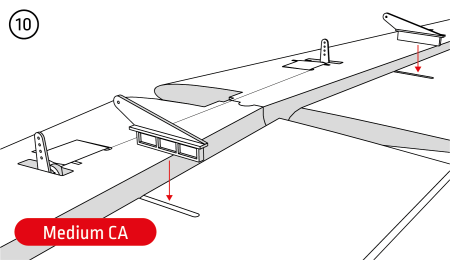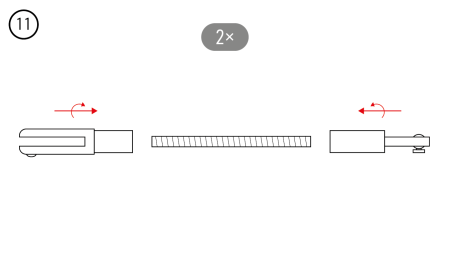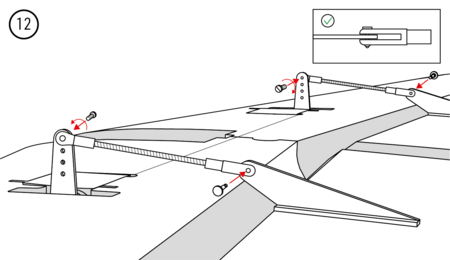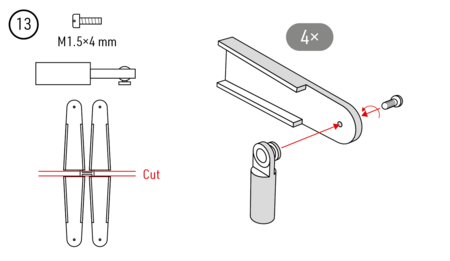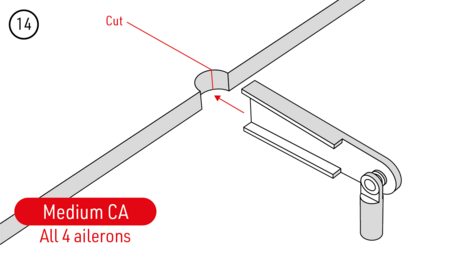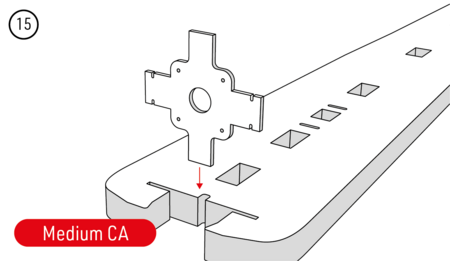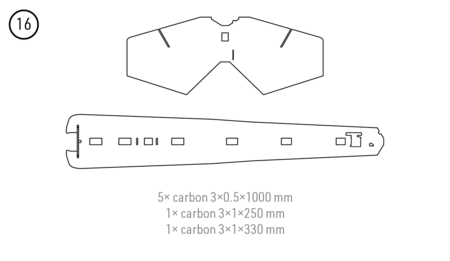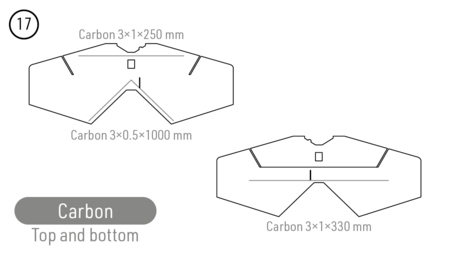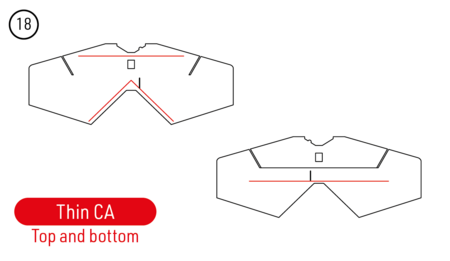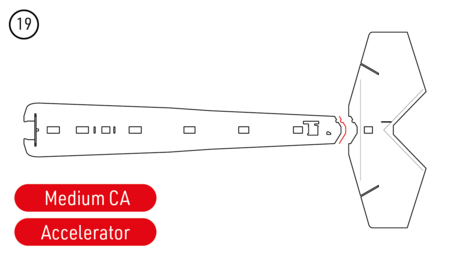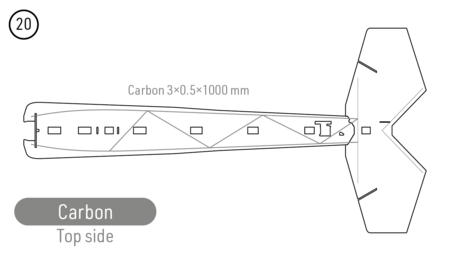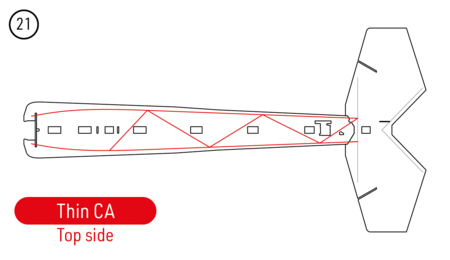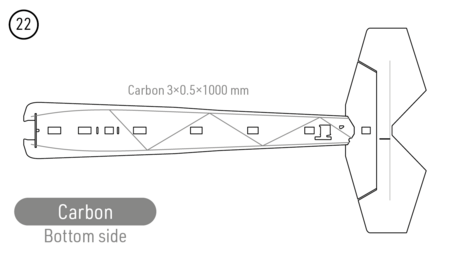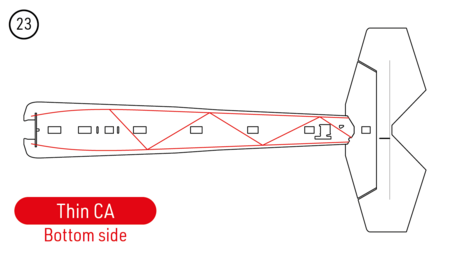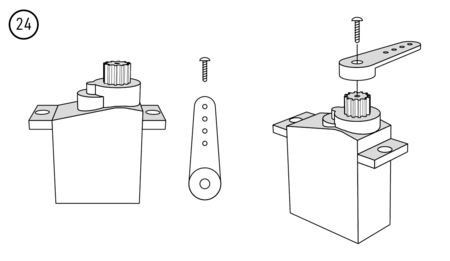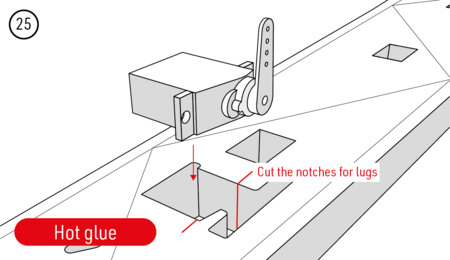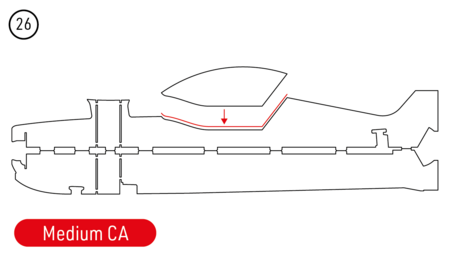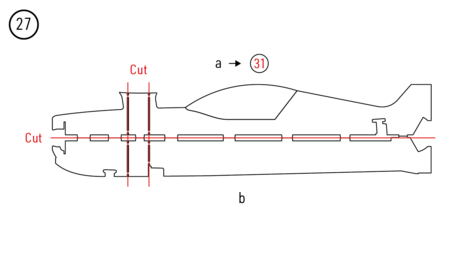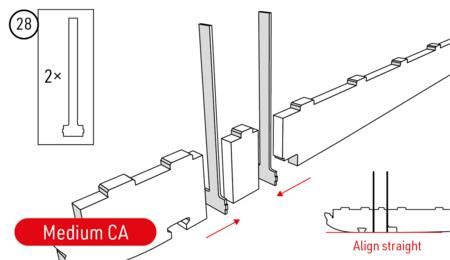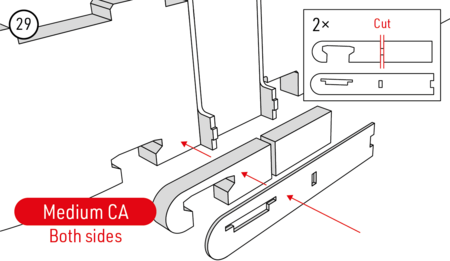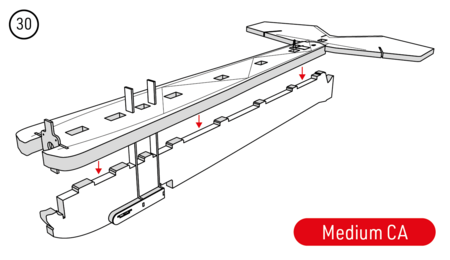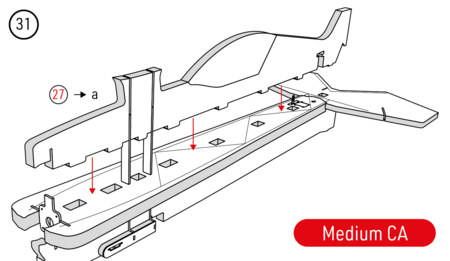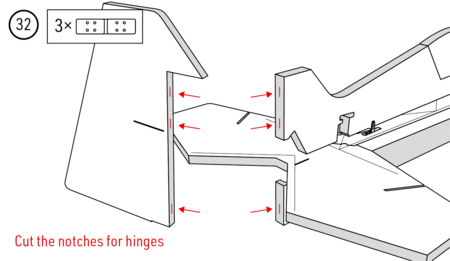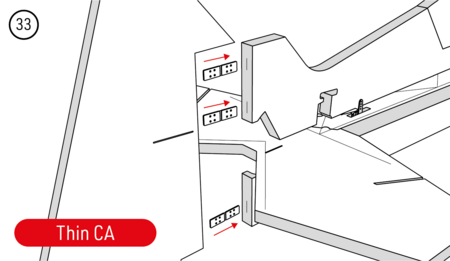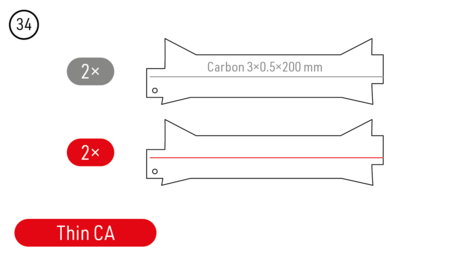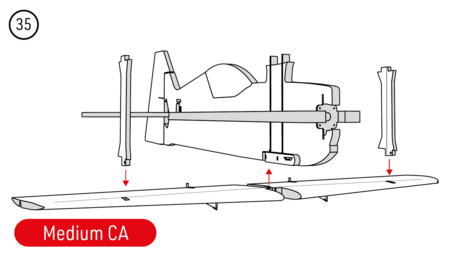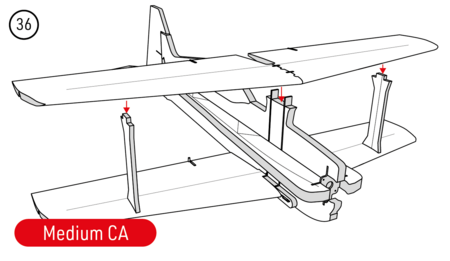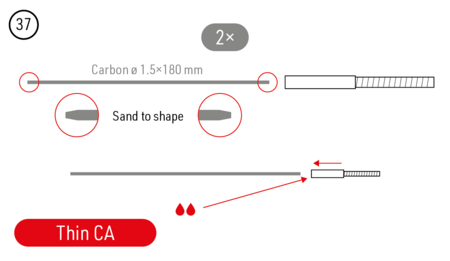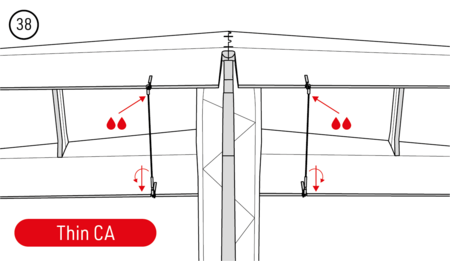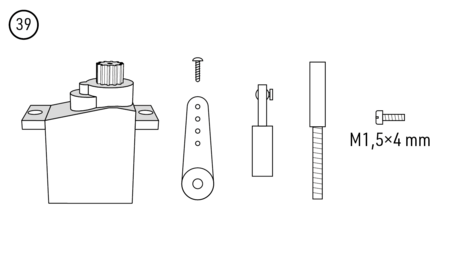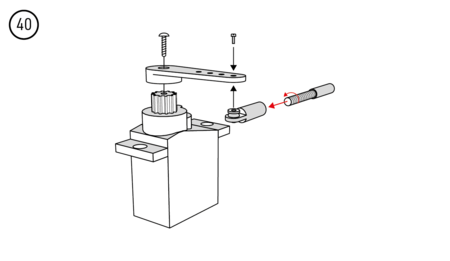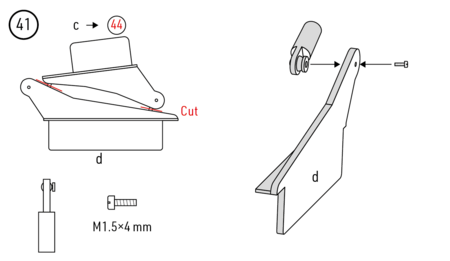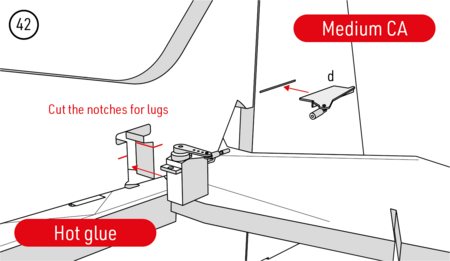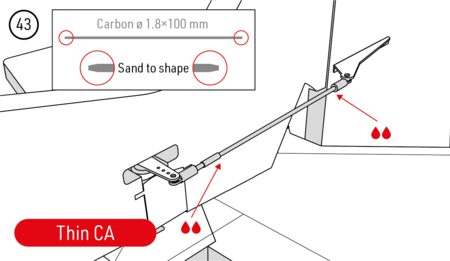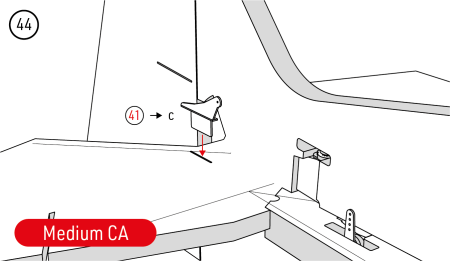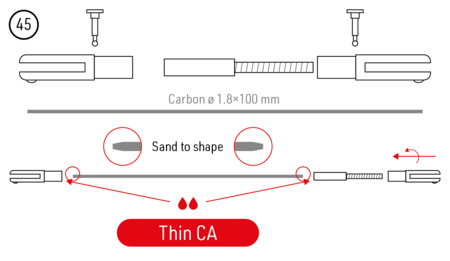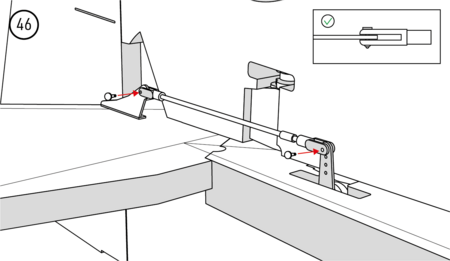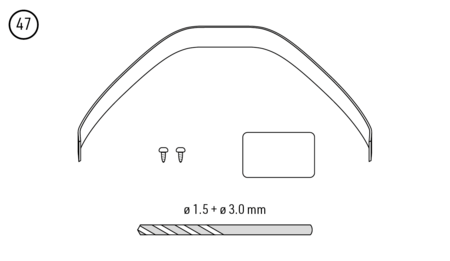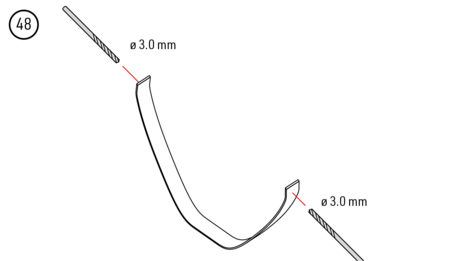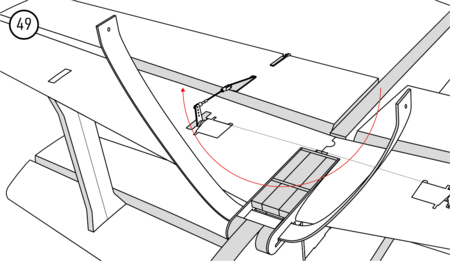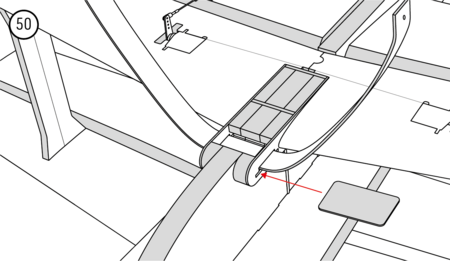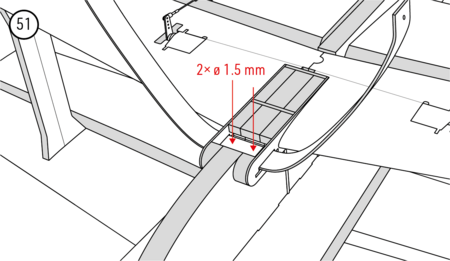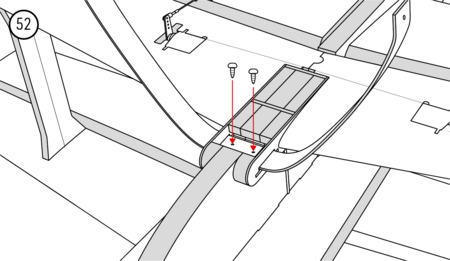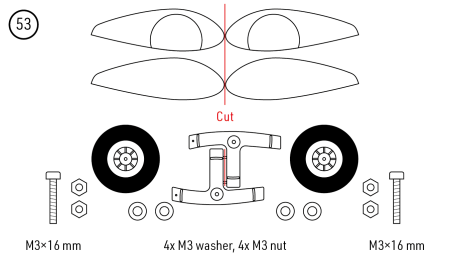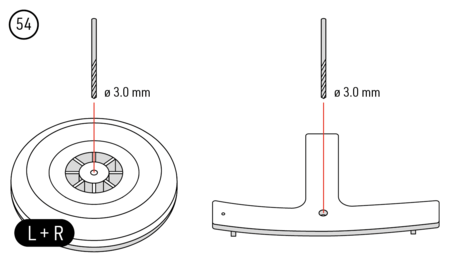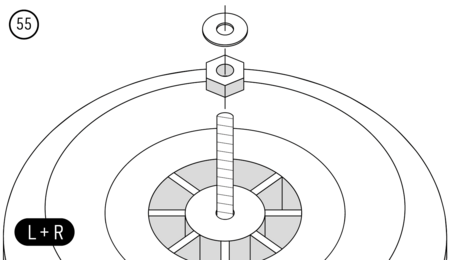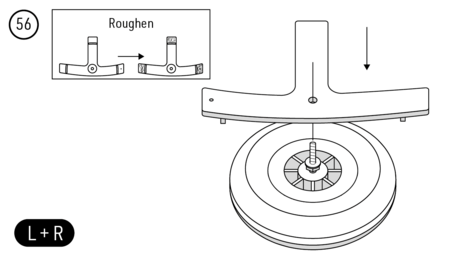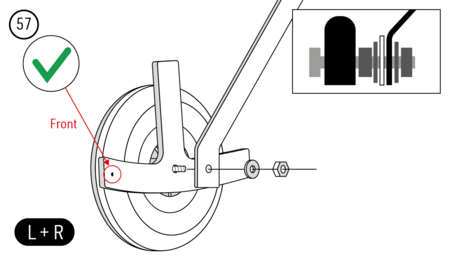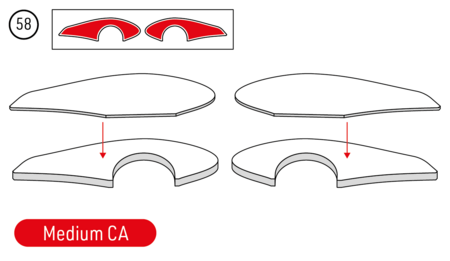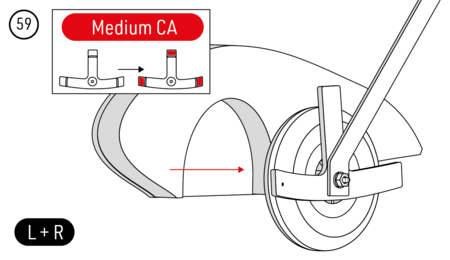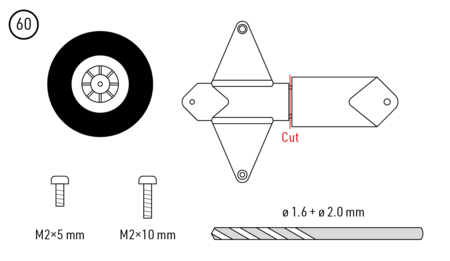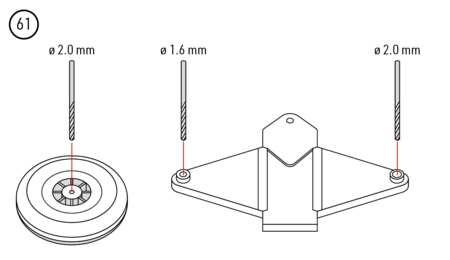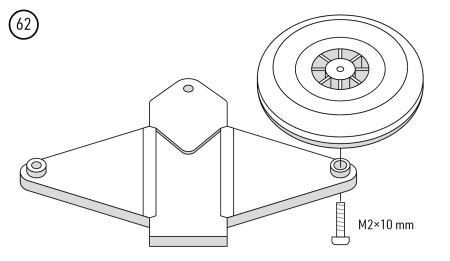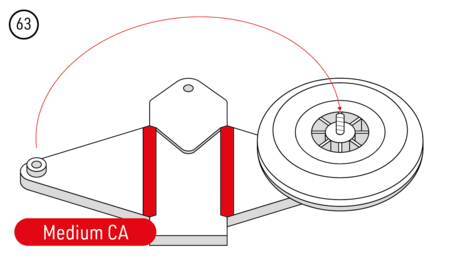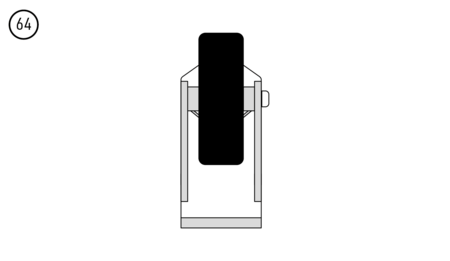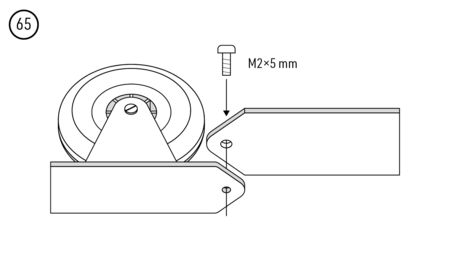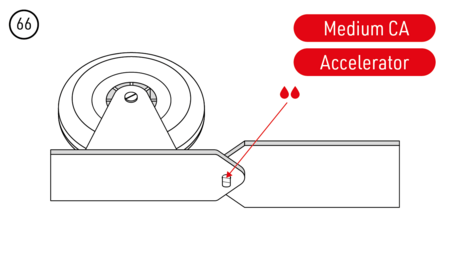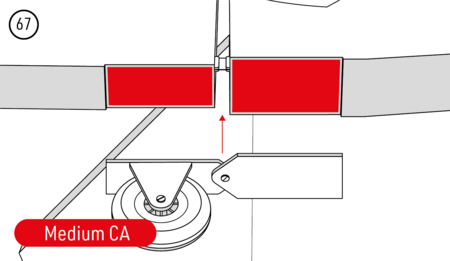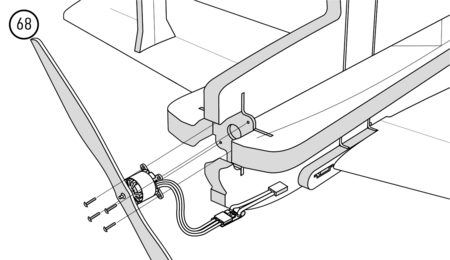KAVAN Vibe - Instruction manual: Difference between revisions
No edit summary |
Mrs. Kavan (talk | contribs) |
||
| (12 intermediate revisions by 2 users not shown) | |||
| Line 3: | Line 3: | ||
<!--T:1--> | <!--T:1--> | ||
=== Introduction === | === Introduction === | ||
Congratulations on your purchase of the high-performance 3D aerobatic model '''VIBE'''. You are about to start assembling a model manufactured from almost unbreakable EPP (expanded polypropylene) foam, powered by a powerful brushless motor and lightweight LiPo battery. Everybody, who has already mastered flying a "full-house" trainer with aileron, elevator, rudder, and throttle control, will enjoy this beast. | Congratulations on your purchase of the high-performance 3D aerobatic RC model '''VIBE'''. You are about to start assembling a model manufactured from almost unbreakable EPP (expanded polypropylene) foam, powered by a powerful brushless motor and lightweight LiPo battery. Everybody, who has already mastered flying a "full-house" trainer with aileron, elevator, rudder, and throttle control, will enjoy this beast. | ||
<!--T:29--> | <!--T:29--> | ||
{{Image frame|width=900|content=[[File:KAVAN Vibe - blue.png|300px| | {{Image frame|width=900|content=[[File:KAVAN Vibe - blue.png|300px|KAV02.8028 KAVAN Vibe - blue]][[File:KAVAN Vibe - green.png|300px|KAV02.8029 KAVAN Vibe - green]][[File:KAVAN Vibe - orange.png|300px|KAV02.8030 KAVAN Vibe - orange]]|align=center|pos=bot|caption=<br>[https://www.kavanrc.com/item/kavan-vibe-blue-161759 '''KAV02.8028'''] '''KAVAN Vibe - {{font color | #0072B6 | blue }}'''   {{!}}   [https://www.kavanrc.com/item/kavan-vibe-green-161760 '''KAV02.8029'''] '''KAVAN Vibe - {{font color | #39B54A | green}}'''   {{!}}   [https://www.kavanrc.com/item/kavan-vibe-orange-161761 '''KAV02.8030'''] '''KAVAN Vibe - {{font color | #F37021 | orange}}'''}} | ||
<!--T:2--> | <!--T:2--> | ||
| Line 52: | Line 52: | ||
<!--T:6--> | <!--T:6--> | ||
=== You will need === | === You will need === | ||
* At least a four-channel RC kit, a power unit with | * At least a four-channel RC kit, a power unit with 3–4S LiPo flight pack and servos - refer to "Recommended power systems and servos." | ||
* '''Regular modeller‘s tools:''' modeller‘s knife, screwdrivers, pliers, electric drill with drill bits, No. 180–360 sandpaper, etc. | * '''Regular modeller‘s tools:''' modeller‘s knife ([https://www.kavanrc.com/item/kavan-knife-with-cutting-mat-156305 KAV66.770]), screwdrivers, pliers, electric drill with drill bits, No. 180–360 sandpaper, etc. | ||
* '''Glue:''' medium and thin CA glue, accelerator for CA glue, hot melt glue. | * '''Glue:''' medium and thin CA glue ([https://www.kavanrc.com/item/kavan-power-ca-20g-thin-en-152583 KAV56.9951], [https://www.kavanrc.com/item/kavan-power-ca-20g-medium-en-152585 KAV56.9952]), accelerator for CA glue ([https://www.kavanrc.com/item/kavan-ca-activator-spray-150ml-152569 KAV56.9958]/[https://www.kavanrc.com/item/kavan-ca-activator-spray-200ml-152570 KAV56.9959]), hot melt glue. | ||
<!--T:7--> | <!--T:7--> | ||
| Line 71: | Line 71: | ||
|- | |- | ||
|'''Motor''' | |'''Motor''' | ||
|KAVAN C3536-1000 | |[https://www.kavanrc.com/item/kavan-brushless-motor-c3536-1000-140805 KAVAN C3536-1000] | ||
|KAVAN | |[https://www.kavanrc.com/item/kavan-brushless-motor-c3536-1000-140805 KAVAN C3536-1000] | ||
|KAVAN | |[https://www.kavanrc.com/item/kavan-brushless-motor-c3536-1000-140805 KAVAN C3536-1000] | ||
|- | |- | ||
|'''Propeller''' | |'''Propeller''' | ||
|APC | |[https://www.kavanrc.com/item/apc-11x4-7-slow-flyer-pusher-112933 APC 11×4.7"SF] | ||
|APC | |[https://www.kavanrc.com/item/apc-11x4-7-slow-flyer-pusher-112933 APC 11×4.7"SF] | ||
|APC | |[https://www.kavanrc.com/item/apc-11x4-7-slow-flyer-pusher-112933 APC 10×4.7"SF] | ||
|- | |- | ||
|'''ESC''' | |'''ESC''' | ||
|KAVAN R-40SB Plus | |[https://www.kavanrc.com/item/kavan-r-40sb-plus-brushless-ecs-sbec-40a-153744 KAVAN R-40SB Plus] | ||
|KAVAN R-50SB Plus | |[https://www.kavanrc.com/item/kavan-r-50sb-plus-brushless-esc-sbec-50a-153745 KAVAN R-50SB Plus] | ||
|KAVAN R-50SB Plus | |[https://www.kavanrc.com/item/kavan-r-50sb-plus-brushless-esc-sbec-50a-153745 KAVAN R-50SB Plus] | ||
|- | |- | ||
|'''Battery''' | |'''Battery''' | ||
|KAVAN LiPo 11,1V 1800mAh 40/80C | |[https://www.kavanrc.com/item/kavan-li-po-1800mah-11-1v-40-80c-20-0wh-140752 KAVAN LiPo 11,1V 1800mAh 40/80C] | ||
|KAVAN LiPo 11,1V 1300mAh 40/80C | |[https://www.kavanrc.com/item/kavan-li-po-1300mah-11-1v-40-80c-14-4wh-140749 KAVAN LiPo 11,1V 1300mAh 40/80C] | ||
|KAVAN LiPo 14,8V 1300mAh 40/80C | |[https://www.kavanrc.com/item/kavan-li-po-1300mah-14-8v-40-80c-19-24wh-140750 KAVAN LiPo 14,8V 1300mAh 40/80C] | ||
|- | |- | ||
|'''Servos''' | |'''Servos''' | ||
|KAVAN GO-13MG | |[https://www.kavanrc.com/item/go-13mg-servo-13g-0-12s-60-2-8kg-cm-140701 KAVAN GO-13MG] | ||
|[https://www.kavanrc.com/item/go-1013mg-0-13s-60-3-8kg-cm-144745 KAVAN GO-1013MG] | |||
|[https://www.kavanrc.com/item/go-1013mg-0-13s-60-3-8kg-cm-144745 KAVAN GO-1013MG] | |||
|} | |} | ||
<!--T:8--> | <!--T:8--> | ||
=== RC kit installation and pre-flight check === | === RC kit installation and pre-flight check === | ||
* Refer to the instruction manual of your radio and carefully hook up the on-board electronics. The correct linkage length and control surface neutral position - refer to assembly steps 37, 43 and 45. | * Refer to the instruction manual of your radio and carefully hook up the on-board electronics. The correct linkage length and control surface neutral position - refer to assembly steps '''37''', '''43''' and '''45'''. | ||
* When everything is correctly connected, turn on your transmitter and plug in the flight pack. Check the neutral positions and throws of all control surfaces. If you need to make the control surface throws smaller, simply move the pushrod closer to the centre on the servo arm, or move it farther from the control surface on the control horn. And vice versa. | * When everything is correctly connected, turn on your transmitter and plug in the flight pack. Check the neutral positions and throws of all control surfaces. If you need to make the control surface throws smaller, simply move the pushrod closer to the centre on the servo arm, or move it farther from the control surface on the control horn. And vice versa. | ||
| Line 104: | Line 104: | ||
{| class="wikitable" | {| class="wikitable" | ||
|+ | |+ | ||
! rowspan="2" |Recommended | ! rowspan="2" |Recommended throws | ||
throws | |||
! colspan="2" |'''Low rate''' | ! colspan="2" |'''Low rate''' | ||
! colspan="2" |'''High rate''' | ! colspan="2" |'''High rate''' | ||
| Line 134: | Line 133: | ||
<!--T:32--> | <!--T:32--> | ||
* The "Low | * The "'''Low rate'''" recommended control surface throws are suitable for a less skilled pilot and classic pattern aerobatics; the "'''High rate'''" setting is for 3D aerobatic and skilled pilots. | ||
* Check the direction of rotation of the propeller. If incorrect, swap two of the three wires between the ESC and motor or program the ESC (refer to the ESC manual). | * Check the direction of rotation of the propeller. If incorrect, swap two of the three wires between the ESC and motor or program the ESC (refer to the ESC manual). | ||
* Attach the flight pack to the side of the bottom part of the fuselage using a strip of hook-and-loop tape to get the correct position of the centre of gravity (CG) 85 mm, refer to Fig. 69. You can fine-tune the CG position later to suit your flying style. | * Attach the flight pack to the side of the bottom part of the fuselage using a strip of hook-and-loop tape to get the correct position of the centre of gravity (CG) 85 mm, refer to '''Fig. 69.''' You can fine-tune the CG position later to suit your flying style. | ||
* Fully charge your flight pack and transmitter batteries, check the proper function of your radio and perform the range check of your radio according to its instruction manual. The range has to be almost the same with the motor off and at full throttle (no more than a 10% decrease is acceptable). DO NOT try to fly unless the range check is 100% successful. | * Fully charge your flight pack and transmitter batteries, check the proper function of your radio and perform the range check of your radio according to its instruction manual. The range has to be almost the same with the motor off and at full throttle (no more than a 10% decrease is acceptable). DO NOT try to fly unless the range check is 100% successful. | ||
=== Flying === | === Flying === | ||
The test flying and fine-tuning is pretty much straightforward. There will be no surprise for a medium-advanced pilot who is supposed to fly this model. | The test flying and fine-tuning is pretty much straightforward. There will be no surprise for a medium-advanced pilot who is supposed to fly this model. | ||
| Line 248: | Line 246: | ||
|5 | |5 | ||
|Carbon | |Carbon | ||
|3×0 | |3×0.5×1000 mm | ||
|20, 22 | |20, 22 | ||
|- | |- | ||
| Line 430: | Line 428: | ||
|2 | |2 | ||
|Steel | |Steel | ||
| | |M2×40 mm screw | ||
|9 | |9 | ||
|- | |- | ||
| Line 436: | Line 434: | ||
|2 | |2 | ||
|Carbon | |Carbon | ||
|Ø1. | |Ø1.5×180 mm | ||
|37 | |37 | ||
|- | |- | ||
Latest revision as of 07:16, 6 May 2024
Introduction
Congratulations on your purchase of the high-performance 3D aerobatic RC model VIBE. You are about to start assembling a model manufactured from almost unbreakable EPP (expanded polypropylene) foam, powered by a powerful brushless motor and lightweight LiPo battery. Everybody, who has already mastered flying a "full-house" trainer with aileron, elevator, rudder, and throttle control, will enjoy this beast.
Warning
- This RC model is not a toy. Use it with care and strictly follow the instructions in this manual.
- Assemble this model following strictly these instructions. DO NOT modify or alter the model. Failing to do so will lapse the warranty automatically. Follow the instructions to obtain a safe and solid model at the end of the assembly.
- Children under the age of 14 must operate the model under the supervision of an adult.
- Assure that the model is in perfect condition before every flight. Check if all the equipment works correctly and if the model is undamaged in its structure.
- Fly only on days with a light breeze and in a safe place away from any obstacles or sources of interference.
Before you start
- If you are not an experienced RC pilot, plan to have a fully competent pilot check your completed model and help you with your first flights. Even though we have tried to provide you with a thorough instruction manual, RC models are rather complicated, and an experienced modeller can quickly check over your model to ensure your first flights are successful.
- Please assemble your model according to these instructions. Do not modify or change your model in any way. Doing so may adversely change its flying characteristics.
- Before you begin, check the entire contents of this kit to make sure no parts are missing or damaged. It will also help you to become familiar with each component of your plane. If you find that any of the parts are either missing or damaged, contact your dealer immediately for replacement.
- Note: Your dealer cannot accept kits for return if construction has begun.
- Trial fit each part before glueing it in place. Before assembling, make sure you are using the correct part and that it fits well. No amount of glue can make up for a poorly fitting part.
- The manual contains a drawing showing the default Centre of Gravity (CG) position and recommended control surface throws. Please note it is essential to keep the recommended CG position for the first flight, or the model could be unstable, hard to control or even unable to fly. Later, you can fine-tune the CG position to suit your flying style and skills.
Safety precautions and warnings
- An RC aeroplane is not a toy! If misused, it can cause serious bodily harm and damage to property. Fly only in a safe place, following all instructions and recommendations in this manual. Beware of the propeller! Keep loose items that can get entangled in the propeller away from the spinning propeller, including loose clothing or other objects such as pencils and screwdrivers. Ensure that your and other people’s hands and face are kept away from the rotating propeller.
- As the user of this product, you are solely responsible for operating it in a manner that does not endanger yourself and others or result in damages to the product or the property of others. This model is controlled by a radio signal subject to interference from many sources outside your control. This interference can cause momentary loss of the controls, so it is advisable to always keep a safe distance in all directions around your model, as this margin will help to avoid collisions or injury.
- Never operate your model with low transmitter batteries.
- Always operate your model in an open area away from power lines, cars, traffic, or people. Avoid operating your model in populated areas where injury or damage can occur.
- Carefully follow the directions and warnings for this and any optional support equipment (chargers, rechargeable batteries, etc.) which you use.
- Keep all chemicals, small parts and anything electrical out of the reach of children.
- Moisture causes damage to electronics. Avoid water exposure to all equipment not specifically designed and protected for this purpose.
- The model is made mainly of plastic - it is not fireproof. It may not be exposed to higher temperatures, otherwise severe distortion of the foam airframe or other damage may occur.
Technical specifications
| Wingspan | 1000 mm |
| Length | 1030 mm |
| All-up weight | 750–800 g |
You will need
- At least a four-channel RC kit, a power unit with 3–4S LiPo flight pack and servos - refer to "Recommended power systems and servos."
- Regular modeller‘s tools: modeller‘s knife (KAV66.770), screwdrivers, pliers, electric drill with drill bits, No. 180–360 sandpaper, etc.
- Glue: medium and thin CA glue (KAV56.9951, KAV56.9952), accelerator for CA glue (KAV56.9958/KAV56.9959), hot melt glue.
Recommended power systems and servos
- Sunday 3D: For 3D aerobatic beginners and Sunday flyers.
- 3D: For everybody who likes it hot and 3D.
| 3S LiPo - Sunday 3D | 3S LiPo - 3D | 4S LiPo - 3D | |
|---|---|---|---|
| Motor | KAVAN C3536-1000 | KAVAN C3536-1000 | KAVAN C3536-1000 |
| Propeller | APC 11×4.7"SF | APC 11×4.7"SF | APC 10×4.7"SF |
| ESC | KAVAN R-40SB Plus | KAVAN R-50SB Plus | KAVAN R-50SB Plus |
| Battery | KAVAN LiPo 11,1V 1800mAh 40/80C | KAVAN LiPo 11,1V 1300mAh 40/80C | KAVAN LiPo 14,8V 1300mAh 40/80C |
| Servos | KAVAN GO-13MG | KAVAN GO-1013MG | KAVAN GO-1013MG |
RC kit installation and pre-flight check
- Refer to the instruction manual of your radio and carefully hook up the on-board electronics. The correct linkage length and control surface neutral position - refer to assembly steps 37, 43 and 45.
- When everything is correctly connected, turn on your transmitter and plug in the flight pack. Check the neutral positions and throws of all control surfaces. If you need to make the control surface throws smaller, simply move the pushrod closer to the centre on the servo arm, or move it farther from the control surface on the control horn. And vice versa.
| Recommended throws | Low rate | High rate | ||
|---|---|---|---|---|
| Rate | Expo | Rate | Expo | |
| Ailerons | ± 20° | 30–40 % | ± 35° or more | 40 % |
| Elevator | ± 30° | 30–40 % | ± 50° or more | 40 % |
| Rudder | ± 35° | 40–45 % | ± 47° | 45 % |
- The "Low rate" recommended control surface throws are suitable for a less skilled pilot and classic pattern aerobatics; the "High rate" setting is for 3D aerobatic and skilled pilots.
- Check the direction of rotation of the propeller. If incorrect, swap two of the three wires between the ESC and motor or program the ESC (refer to the ESC manual).
- Attach the flight pack to the side of the bottom part of the fuselage using a strip of hook-and-loop tape to get the correct position of the centre of gravity (CG) 85 mm, refer to Fig. 69. You can fine-tune the CG position later to suit your flying style.
- Fully charge your flight pack and transmitter batteries, check the proper function of your radio and perform the range check of your radio according to its instruction manual. The range has to be almost the same with the motor off and at full throttle (no more than a 10% decrease is acceptable). DO NOT try to fly unless the range check is 100% successful.
Flying
The test flying and fine-tuning is pretty much straightforward. There will be no surprise for a medium-advanced pilot who is supposed to fly this model.
Parts list
Main parts
| Part | Quantity | Material | Dimensions | Step no. |
|---|---|---|---|---|
| Instruction manual | 1 | Paper | A4 | |
| Fuselage - vertical part | 1 | EPP | 26 | |
| Fuselage - horizontal part | 1 | EPP | 19 | |
| Top wing - left + right | 1+1 | EPP | 2 | |
| Bottom wing - left + right | 1+1 | EPP | 2 | |
| Canopy | 1 | EPP | 26 | |
| Rudder | 1 | EPP | 32 | |
| Horizontal tailplane | 1 | EPP | 16 | |
| Wing strut | 2 | EPP | 34 | |
| Undercarriage block | 2 | EPP | 29 | |
| Wheel pant - inner | 2 | EPP | 53 | |
| Wheel pant - outer | 2 | EPP | 53 | |
| Main Undercarriage | 1 | Carbon | 47 | |
| Fuselage vertical reinforcement | 2 | Plywood | 3 mm | 28 |
Carbon parts bundle
| Part | Quantity | Material | Dimensions | Step no. |
|---|---|---|---|---|
| Carbon spar | 5 | Carbon | 3×0.5×1000 mm | 20, 22 |
| Carbon spar | 1 | Carbon | 3×1.0×330 mm | 17 |
| Carbon spar | 1 | Carbon | 3×1.0×250 mm | 17 |
| Carbon spar | 2 | Carbon | 3×0.5×200 mm | 34 |
| Carbon rod | 4 | Carbon | Ø1.5×800 mm | 4 |
Small accessories bag
| Part | Quantity | Material | Dimensions | Step no. |
|---|---|---|---|---|
| Firewall | 1 | Plywood | 3 mm | 15 |
| Rudder hinge | 3 | Plastic | 32 | |
| Elevator pushrod | 1 | Carbon | Ø1.8×100 mm | 45 |
| Rudder pushrod | 1 | Carbon | Ø1.8×100 mm | 45 |
| Aileron horn | 2 | Plastic | 9 | |
| Rudder horn | 1 | Plastic | 41 | |
| Elevator horn | 1 | Plastic | 41 | |
| Aileron joiner horn | 4 | Plastic | 13 | |
| Undercarriage holder | 2 | Fibreglass | 1.5 mm | 29 |
| Undercarriage plate | 1 | Fibreglass | 1.5 mm | 47 |
| Wheel | 2 | Plastic | Ø50 mm | 53 |
| Tailwheel | 1 | Plastic | Ø25 mm | 60 |
| Wheel pant holder | 2 | Plastic | 53 | |
| Wheel axle | 2 | Steel | M3×16 mm socket screw | 53 |
| M3 nut | 4 | Steel | M3 | 53 |
| M3 washer | 4 | Steel | Ø6 mm | 53 |
| Undercarriage bolt | 2 | Steel | 3.8×7 mm self-tapping screw | 47 |
| Tailwheel bracket | 1 | Plastic | 60 | |
| Tailwheel axle | 1 | Steel | M2×10 mm screw | 60 |
| Tailwheel bracket axle | 1 | Steel | M2×5 mm screw | 60 |
| Ball link | 8 | Plastic/brass | 9, 39 | |
| Ball link screw | 8 | Steel | M1.5x5 mm screw | 9, 39 |
| Clevis | 4 | Plastic | 9 | |
| Clevis pin | 4 | Brass | 9 | |
| Aileron pushrod | 2 | Steel | M2×40 mm screw | 9 |
| Aileron joiner rod | 2 | Carbon | Ø1.5×180 mm | 37 |
| M2/2 threaded coupler | 2 | Brass | 45 | |
| M2/1.5 threaded coupler | 2 | Brass | 37 |
Assembly
Follow the illustrated, step-by-step building manual below.
Guarantee
The KAVAN Europe s.r.o. products are covered by a guarantee that fulfils currently valid legal requirements in your country. If you wish to make a claim under a guarantee, please contact the retailer from whom you first purchased the equipment. The guarantee does not cover faults caused in the following ways: crashes, improper use, incorrect connection, reversed polarity, maintenance work carried out late, incorrectly or not at all, or by unauthorised personnel, use of other than genuine KAVAN Europe s.r.o. accessories, modifications or repairs which were not carried out by KAVAN Europe s.r.o. or an authorised KAVAN Europe s.r.o., accidental or deliberate damage, defects caused by normal wear and tear, operation outside the Specification, or in conjunction with equipment made by other manufacturers. Please be sure to read the appropriate information sheets in the product documentation!
If you have any questions about the VIBE and its operation, please contact the technical and service staff at KAVAN Europe s.r.o. by e-mail (info@kavanrc.com for general technical information, service@kavanrc.com for service) or by phone (+420 466 260 133 for general technical information, +420 463 358 700 for service), during working hours 8:00 AM–4:00 PM CET, Monday to Friday).
